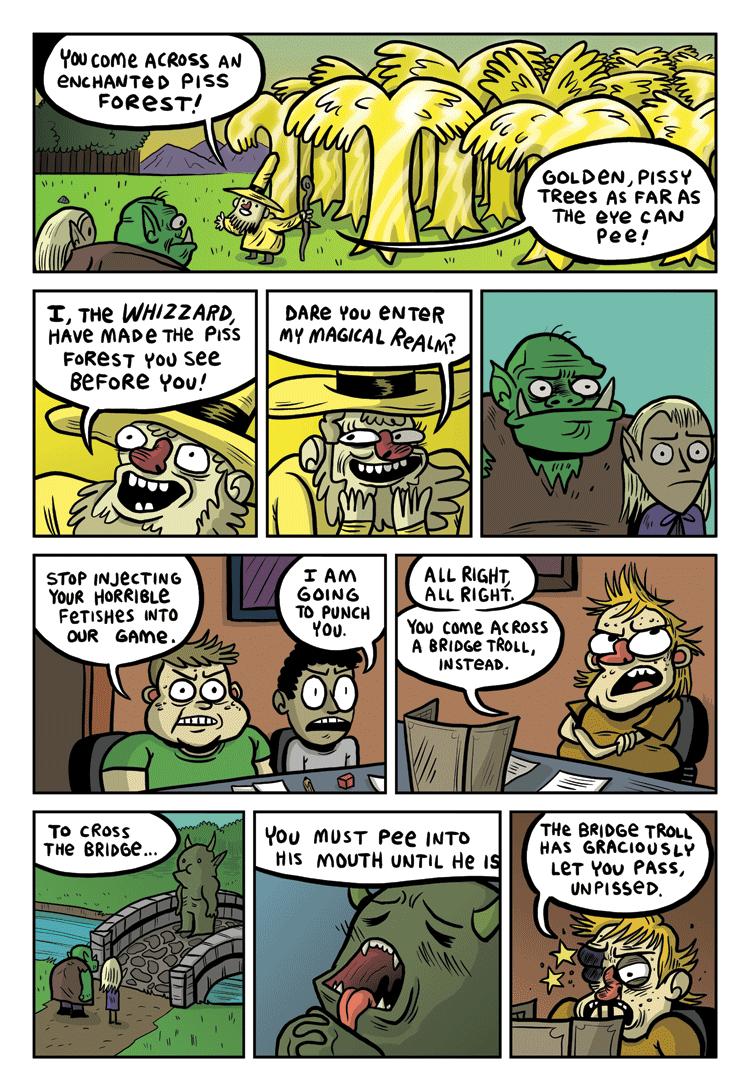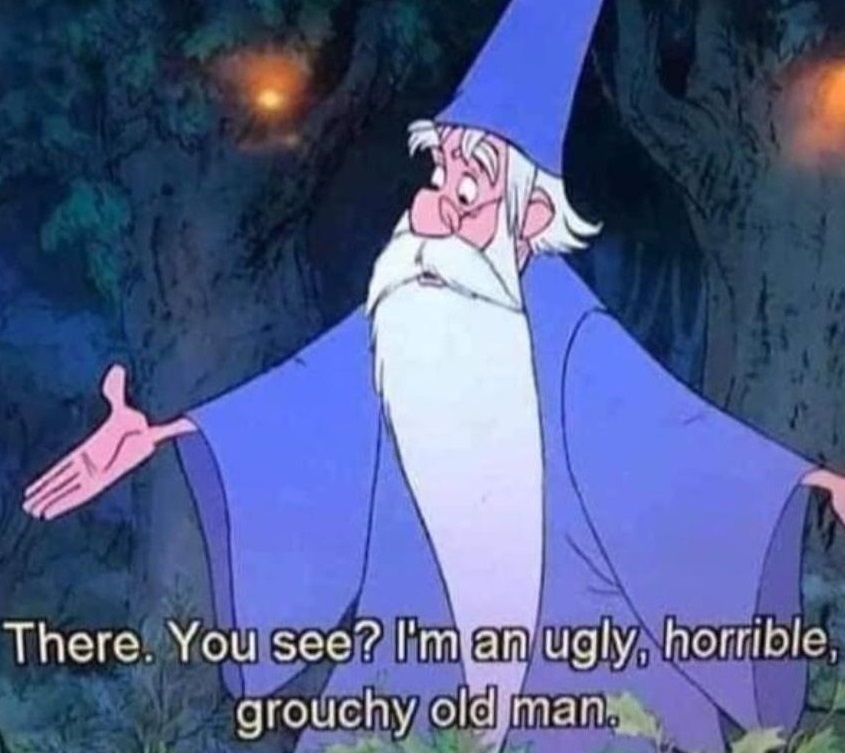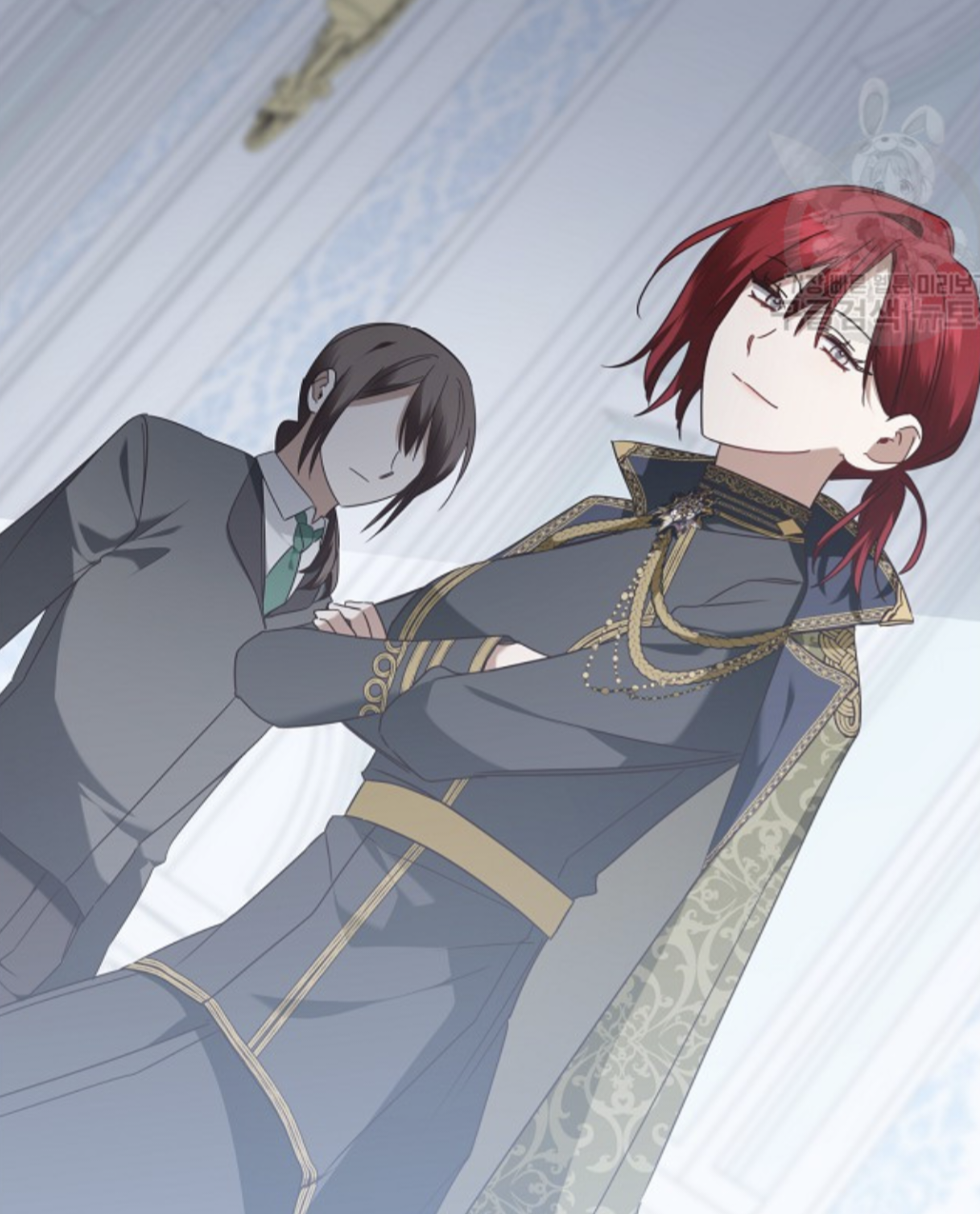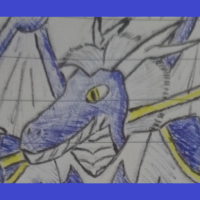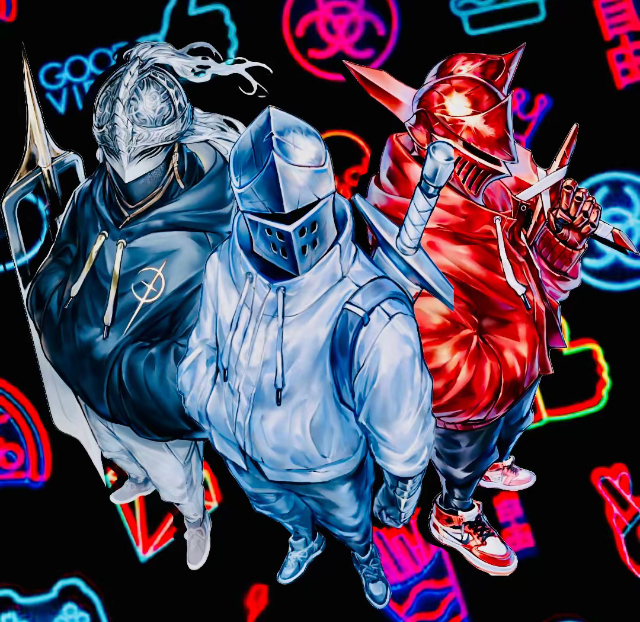Every time people lament changes to the lore that amount to “not every member of species X is irredeemably evil” and claim the game is removing villains from it, I think how villains of so-caleld evil species fall into two cathegories: a) bland and boring and b)have something else, unrelated to their species going on for them, that makes them interesting.
I feel like the bigger reason to have evil races is to have a more or less ever present challenge and point of conflict. For instance, the underdark is horrible place to be, in large part due to the drow. Their presence and general alignment of evil makes the setting dangerous and interesting. Is this town safe? Have the drow been messing about assassinating local leaders? Should we help this group by liberating them from slavery from the drow?
It’s almost like their species is in of itself a character, with this species sized character being evil. Having an entire species be generally evil gives the world more scale than a single evil character would. But yes, an individual villain needs more than just their evil race to be interesting.
But the reason the drow are evil is primarily because of the Spider god Lolth, not because they’re Drow. Drow free from Lolth aren’t necessarily evil.
Absolutely. But I wasn’t talking about the lore reason why they’re generally evil.
Drow freed from Lolth, in isolation of another way being convincingly presented to - likely forced on - them, have had how many thousands of years of abusive culture hammered & manipulated into them. More likely than not they’ll still develop an evil culture, though the structure of their society would likely shift due to power gaps. Given how they work either a single powerful demagogue or some sort of council system of the great houses.
Drow even under Lolth aren’t necessarily evil but she set them up for biological rewards for evil whenever she can (there’s little detail on this but I think that’s concept’s the source of the terrible “mother’s ecstasy at womb murders” thing - good idea, bad example/implementation), on top of enforcing an ongoing culture of brutality and wickedness. Its how most of the evil deities still allow for Free-will to empower their Faith. They combine physiological reward hijacking, adding aspects that encourage easier exclusion from others (isolation is good for limiting options), and rigorous and brutal cultural and societal reinforcement. It doesn’t prevent good, but it gives far higher hurdles for an evil race to overcome.
Polar Bears have a “evil race” reputation… I’m sure they are just misunderstood and will explain it to you while they disembowel you
Polar bears aren’t intelligent enough to be evil. Depending on edition, they’re either unaligned or true neutral.
I think a huge problem with this is trying to frame everything through D&D as well as our perspective. Fuck modern D&D and its desire to control the entire dialogue. Wizards of the Coast aside, there’s also a fantasy component here. I personally dislike requiring all races to act exactly like humans with human motives. From a specific perspective, we view the wanton murder and sacrifice of wood elves by the drow as a terribly evil thing. From the drow perspective, why can’t the opposite be true? I’m not talking about Salvatore’s one-sided writing that makes it clear the whole thing is a massive con. D&D is very biased toward human motive and perspective. Why can’t both be true? Drow are evil to us and we are evil to them? That’s a much more interesting story and completely changes the narrative around someone like Drizzt.
This is a really nuanced take on speculative fiction in general. I also strongly feel that, the way WotC writes things, removing racial alignment is very important. There is no nuance in their universe. Even when we see other races, we always evaluate their action through a human lens rather than being presented a cogent paradigm contrary to ours.
DnD good and evil are distinct from common usage of the terms; they are cosmic forces, objective truths. Each action reverberates through the higher and lower planes and tilts the scales towards victory for one side or another in their eternal struggle. This lore doesn’t leave a ton of room to change the alignment of entire races (and that is by design, structure makes it easier for people to get in to the setting).
But this is just in the established settings, any DM is free to homebrew any setting and justification they like.
Note that I am not trying to defend this as the height of storytelling, it isn’t. It is a consequence of how the setting is justified - with deities being active participants, having specific rules for granting and revoking powers, and the physical presence of higher and lower planes embodying perfect conceptions of ‘good’, ‘evil’, order, chaos, etc. All of this can be changed, and again any DM is free to change it, but the ‘deep lore’ of the established settings over the past 40 years is drenched in this stuff.
One way to consider it is simply - the Drow aren’t evil because they are Drow. The Drow are evil because their culture promotes actions that align with the literal true definition of evil that is present in the setting. Evil doesn’t mean bad, it is just a label aligning with some physical rule of the universe. Just like the positive charge of a proton and negative charge of an electron are labels for physical rules of our own universe. Positive isn’t any better than negative, but they are inherently distinct.
What you’re describing is closer to the nuance I’m interested in than WotC’s settings. If you read some of the later Lolth stuff, it’s the exact opposite of that. Evil is bad and the justification for anything always involves this trite movement from evil to good. They’re not presented as counterbalances or equal combatants. Even evil characters seem to always be working under the assumption that good characters are ultimately better.
The 40k universe has a lot of similarities. However, I’d argue its authors are somewhat better at presenting why Chaos is an equally valid choice or why the Orks can do whatever they want. There isn’t a clear choice (some authors are fucking terrible at this and drive WotC-style to the goodness of the Imperium).
The only reason WotC has to remove alignment from races is because WotC has made it very clear there is the thing people should want and there is the thing people should not want. That’s not an even layout of nine alignments. That’s a huge bias and all of their content reflects that.
Evil races give someone the PCs don’t have to feel bad about killing. Obviously depends on your party, but if they befriend the hungry wolf pack and negotiate with the bandits, then a band of definitely evil goblins gives the barbarian something to smash without worrying if they’re killing little Timmy’s dad.
Edited to add: And if “he’s an evil race” is your only reason for them being a major villain, that’s bad storytelling. About as bad as “yes they’re going to help you because they’re good,” and not for some kind of benefit to them, monetary or spiritual or whatever.
If you can kill something without feeling bad because of its race, that’s fucked up. A group of goblin bandits can be fun, but they’re villains because of the bandit thing, not the goblin thing. Why should a group defined by plundering travelers be more acceptable than a group defined by being short with green skin?
That said, the undead are, more often than not, fair game. Undead are a mockery of the life that came before and a defilement of their corpse, so killing them is a way of honouring the dead.
Why should a group defined by plundering travelers be more acceptable than a group defined by being short with green skin?
Because in a fantasy world, where we can know for 100% certainty that gods created life, it’s not impossible for those gods to have made a certain creature type objectively evil.
In some settings, Orcs are the way they are because their god is the last one to pick a place for them to live, gets pissy, and decides that “Fuck you guys! If that’s how you want to play it, my orcs are going to plunder the shit out of your guys’ lands!”
In other settings, there has to be some kind of cosmic balance to things, and some gods are just evil because there has to be a natural counterpart to good, and so the creatures they create are just inherently evil.
I think the issue is with this kind of debate is that that it’s referred to as “race”. We don’t really have a one-for-one on this IRL (because Goblins don’t exist) and we don’t refer to animals as “different races”.
No, sorry, that still doesn’t answer my question.
Cosmically controlled goblins are doing the same thing as bandits, but the bandits made the choice to do evil things and the goblins didn’t get a chance to refuse. Surely, the people choosing to do evil are worse than those forced to do evil, right? So why are bandits better than goblins?
The suggestions you gave fall kinda flat to me, really. No matter what the in-universe reason is, the DM made the universe. “It’s what my character would do” doesn’t excuse bad behaviour, and neither does “it’s what my gods decided.” You’re the one who made them do that. You’re the one that decided an entire culture of thinking, feeling people are born objectively evil and can be killed en masse. And that’s fucked up.
You’re the one that decided an entire culture of thinking, feeling people are born objectively evil and can be killed en masse. And that’s fucked up.
I think that’s where the issue falls apart. You want them to be thinking feeling people who can change. They don’t have to be. If an evil deity creates Goblins, and makes them evil for whatever reason, they can inherently lack the ability to freely think and evolve.
And there’s nothing “fucked up” about it.
Look at some villains who are just objectively evil. People point-out the Adventure Time Lich all the time, and that thing is just evil. There’s no point trying to argue with it. No point trying to convince it to right its wrongs. It doesn’t care, because it’s just evil.
Goblins have language and culture and religion, and that all requires the ability to think, feel and grow. Making them evil means that either your worldbuilding is nonsense or you’ve made a thinking, feeling group of people inherently evil from birth. If you want a group that doesn’t think, feel or grow, then do what I said in the first place and use undead.
Stop saying it’s an evil deity doing these things. It’s just you. You’re doing these things. Don’t be a coward.
Are you seriously trying to justify Boblin the Goblin being evil because of the Lich from Adventure time? One is the cosmic manifestation of the death of all things, and the other is short and green. That’s not remotely the same.
And most objectively evil villains in fiction are, I shall point out, human. Nothing to do with their species. A group of human bandits and a group of goblin bandits are equally evil. And at no point have you given any explanation as to why that wouldn’t be the case.
Either answer the fucking question or shut the fuck up.
Edit: It would appear they chose to shut the fuck up. I would have preferred they answer the question, but this is acceptable.
Sorry, I didn’t realize you were exclusively arguing in bad faith/trolling. I’ll stop responding.
Y-you…you do realize the lich, as liches generally work this way, was probably once human, right? And is choosing to believe all life must be quelled? Like…that’s an example of an irredeemably evil person who is actively choosing to be irredeemably evil. Moron.
You should probably have specified mindless undead, not just all undead. In fact…anything mindlessly violent. Demons, zombies, etc.
My players ran across some Imperial guardsmen killing off skeletons, only for the orcs accompanying them to protest that they were destroying “registered cultural artifacts!” The orcs didn’t have much, and they would leave their bones to their children to help them eke out a meager existence.
Your players care about race when murdering people. If you want to murder people then just do it.
Also that’s what we have Nazi metaphor’s for
Szass Tam, Sauron, SecCom, The Empire, etc.
Everybody loves zombies - Shane Lacy Hensley
Eh, but maybe the barbarian should have to think about whether smash is the right path forward?
Also, you can have an individual group of enemies who are very clearly definitely evil without needing to relegate an entire species to it.
That said I run campaigns which are pretty far removed from my players wanting to smash dudes without a second thought.
Except the bard, right?
Ayyyyy
I would say that many Mind Flayer villains are quite interesting because they are Mind Flayers.
Personally don’t really find the snack sized Cthulhu aspect that interesting. What really interests me about them is the lore about them once being a great empire of douchebags who were overthrown by those they oppressed (gith) who then took their place politically and now hunt them down. Says a lot BG3 focused on this lore over the Cthulhu monster aspect. Just some good lore building which could have (and I’m sure has) gone to any other races.
How would an oppressed people even have a chance of overthrowing rulers who could read and control their minds?
Gith became resistant to the mind control over the millenia. This is why in 5e the race has psychic resistance. The duergar were also slaves of the mind flayers and this is why they have psionic fortitude. There’s some other races that have been altered due to being enslaved (derro, kuo-toa, quaggoth), usually resulting in some form of psionics and madness.
Part of what makes mind flayers interesting because their society touched and left scars on a lot of other races. Gith are just the loudest about it in part because they live in the Astral Sea where time doesn’t age them so, outside of dying during raids, many of the gith who rebelled can easily still be around leading to the rebellion being fresh in the gith’s minds (as opposed to the duergar for example who live on the material plane in normal time and have had empires rise and fall and numerous generations since the enslavement).
- Escape temporarily with a group
- Find scrolls of modify memory
- Remove memories from all but one escapee
- Rest of the group returns home with no memory of escape or the person left behind
- Escapee on the outside learns the spell modify memory and/or finds more scrolls
- Returns to orchestrate resistance
- The resistance operates in cells which have no memory of being part of the resistance
- “Handlers” are rotated frequently and are responsible for providing memories and stockpiled weapons
- Cell members are given memories, perform missions, and then return home with no memory
- Cells that are compromised are abandoned immediately and their members are never activated again.
- Handlers are personally recruited and serve for short periods of time before being wiped by the next handler.
Seems like a pain, but possible. It would make a good story.
I prefer the culture model significantly. Yes most orcs you meet will be part of a warband, but you may also get the orcish equivalent to Kublai Kahn. Drow have a cruel backstabbing matriarchy, but some surface city drow families only reflect that in that women are default head of household. You aren’t killing that camp of goblins because they’re short and green you’re killing them because they’re bandits, hell you may have been given that quest by a goblin.
And it lets you play with stereotypes vs cultural identities being lost to assimilation.
And it’s not like you can’t just automatically signal evil. Drow assassins probably aren’t up to any good unless you’ve been given a heads up. A goblin or orc raiding party is a raiding party and those are safe to assume are evil even if it’s an aasimar one. Even benevolent illithid eat brains.
And we have an example of this in the gith. The difference between the two types is cultural not biological.
Personally, as a DM I get tired of how many different intelligent species there are. It makes worldbuilding very hard. I tried carving out space for each of them, but it wasn’t worth it. These days I prefer to just get rid of most races, but it’s a bit hard to tell which ones to keep.
That’s one thing I love about shadowruns setting. You have all the races, but they don’t really have to have a space carved out for them, since humans just became these races literally overnight. They just fit in with society as human, but…
Totally agree, shadowrun is so much fun, and the setting (especially in Germany) has so many fun details
Try flipping your process. Instead of working from the full list and taking things out, start from an empty list and add stuff in. If there isn’t a good enough reason for it to be there, don’t put it in. And if this leaves you with just humans, that’s fine.
I’m not removing githyanki from my game. Githyanki were never in my game.
Instead of trying to specifically carve out spaces for each one, try just figuring out the balance of the starting play area and immediate neighboring regions. Then have rough ideas of where some other continents in the world are, and as other spieces come up that are rare for the region you can say they are originally from continent X.
Until the players actually go visit these other places, you don’t need to have societies fully formed and figured out. Once players decide to visit, you should have at least one session of sea/air/whatever travel buffer to give you time to populate new lands (and can then adjust for any storyline/player interest.)
For example, in my campaign I told my players that the elven homeland was in the continent to the south. Three years later they are finally going to visit there, and it turns out I now know that the elders and majority of elves in the capital city live in a giant treetop metropolis while halflings and some other races are engaged in a 1920s style drug-fueled gang warfare on the ground level amidst a technological revolution (Drive-by violence is much more interesting with repeating crossbows and fireballs instead of tommy guns and bombs). The elves care very little about what the “dirty ground races” are up to because as a consequence of their longevity, they are very slow to change and adapt to a changing world.
Had I tried to figure out their society at the start of the campaign, it would have been nothing like that.
I dunno, when you literally have spells that detect or harm specific alignments, it makes good/evil more fundamental than in the real world, and that’s fine for a fantasy world IMO.
I have been doing this but because I want to keep the party on guard. Also I think villains who think they are the good guys or doesn’t think what they are doing is wrong is better than I’m evil because the plot needs it.
Mindflayers are definitly evil (from humanoid perstective) because of their species. They eat and bread brains. And they are interesting.
Can confirm, I run a LOT of dragons and the interesting dragon villains are generally about finding unique takes on their common traits or villains because of their response to their circumstances rather than pure random villainy. We’ve got the red dragon who self-perpetuates her own cycle of violence, we’ve got the black dragon who’s mentally broken because their worldview of being entitled to everything due to their strength collapsed after they lost a territorial struggle, we’ve got the emerald dragon who’s desire not to be bothered by their humanoid allies led them to neglect their promises, we’ve got the silver dragon who loved her friends so much she was willing to fall into necromancy to try and undo their deaths.
Also we have That Bastard With Eight Player Kills.
That said, always remember: To become cliche, something needs to work super well first- so well that everyone does it. It only crosses from great into cliche if everyone does it and forgets why and how it worked in the first place.
I’m known for running mostly human campaigns, but one of my favorite tricks is to run a seemingly human villain with personality traits usually associated with an evil monster, then as the adventure goes on the learn that the heraldry features the monster etc etc.
Of course they know me, so they all think it’s metaphor and inspiration.
But at the very last minute, when they think they have him cornered and taken care of all the lackeys…. SURPRISE MOTHERFUCKERS! He drops his magical disguise and it’s an old fashioned D&D lair boss battle!!!
Oh, please do tell the story of That Bastards With Eight Player Kills
Young Black Dragon called Gendridd, wasn’t meant to be a major obstacle, his personally is that he’s evil mostly just because he’s having a fantastic time being an asshole and constantly taunting people (to the extent that the first and so far only lair effect he’s got is the ability to heckle people at any location in the lair). Anyways he was fully aware that he’d get one-rounded trying to fight a party of four level 7 PCs, so instead of fighting them stole the party’s unattended bags and sat in a tree to taunt them about it before flying off (he did not consider this might lead to fighting them anyway).
The party’s plan was to ambush him in his own territory, so their plan was to cut through some of the most overgrown parts of the swamp to get behind his lair and set up an ambush, instead of confronting any of his minions. However, between several spellcaster party members who had both completely dumped their strength/dexterity and couldn’t cast spells while drowning, party members wearing full heavy armour that weighed them down significantly, and bad rolls, then two of them fell into a bog, and in trying to rescue them the others also fell in and they all drowned, resulting in the first TPK.
Obviously that wasn’t a super satisfying ending, so for closure I offered to run a oneshot with a level 5 party in Gendridd’s lair, sent to avenge the original party, on condition that I wouldn’t hold back with enemy strategy and tactics (no bullshit with magic, just good enemy postioning, balanced teams that had lots of options in fights, and had actual battle plans). They made it through most of the dungeon pretty well, while constantly trading off verbal barbs with Gendridd who basically ran a snarky sports commentary the entire way through, letting them know how eager he was to crush them when they made it to HIS big boss chamber. Anyways they reached the outside of the chamber and they were just preparing to fight the skeletons who were guarding his door when he jumped out of an acid river behind them and got a Surprise Round, hitting two of them with a breath weapon and then rolling good enough initiative to knock out their fragile backline casters.
After that then he’s become popular/respected enough to get Promoted To NPC.
TLDR: First wipe due to RNGiamat cursing the d20 and a party badly suited to dealing with falling in a bog. Second wipe because Gendridd employed the secret chromatic dragon art of ‘lying to people’.
That’s hilarious. First TPK to the hardest boss of the campaign, the bog. And that dungeon crawl with snarky commentary sounds like an absolute blast. Thanks for sharing!
I’d argue Devils, by their nature of being lawful as well as evil, are often interesting villains because of their “species”, but it’s kinda different when it’s a creature literally made from the primordial essence of Evil rather than just a bad dude.
deleted by creator
Not all are made from one guy though. Some are just pulped evil in a can. Even with different outlooks on life there are still things that everyone would hate. Like “very specific crimes” to an infant. I say that’s enough for pure evil
No, equating alignment and morality makes them both meaningless. Morality should be tied to outlooks/philosophies etc, a personal matter of how the individual acts in a situation, while alignment with the forces of good/evil/law/chaos should be a matter of absolute determinism. It’s easy to look at D&D and say it’s wrong, but just because something’s bad in D&D doesn’t mean the idea itself is bad.
I have it to where the good/evil extraplanar creatures are created as expressions of the good and evil within everything sentient.
Yes, exactly - as I put it to my players, a “person” isn’t able to be inherently good or evil. They’ll have their own morals - particular things they always will or won’t do - but alignment is for things literally made of the concept of that alignment.
I’d love to be literal devil’s advocate here and argue devils just think different, in ways usually not immediately beneficial to in-universe society but ultimately a plus by instead providing a stress test for development of what is in universe considered ‘good’. Insert the quote from Legend what is light without dark.
Understandable - I prefer lovecraftian and fey creatures for alien thought processes, and use devils more as a foil/mirror to the lawful god of cities, merchants, and wealth, whomst I hate and will take any opportunity to drag.
I see Fey not as alien, but as capricious. They do what they please, when they please, damn the consequences.
They might commit arson against a local noble and then give that noble’s kid a super fancy cake; and not have a reason for either beyond “lol, lmao”
Always interpreted planar creatures as having an alien thought process in general. That is a good use of devils ngl, for related playing pallies/clerics with ‘my higher power is the people’ is quite fun.
Gotta agree with that one as removing pre-existing restrictions from character (playable or not) creation like predetermined “evilness” offers virtually no drawbacks. It opens up the game by improving its core sandbox mechanics and if one dislikes that change then they can just ignore it.
There’s a game called Wildermyth where every faction is inherently incompatible with humans, but none of them are inherently evil.
For example, the Gorgons are an empire seeking to reclaim lost territory. This is fair, but they’re aquatic, so they need to flood the world to take it back. Humans naturally need to fight them in order to survive, and there’s no real way to compromise on that. It doesn’t help that they ooze corruption everywhere they go.
Wildermyth is a fucking legendary game and everyone should play through All The Bones Of Summer
Everyone should play through all of it! Eluna and the Moth is amazing! Sunswallower’s Wake is amazing! A Walk in the Unlight is amazing! I may like this game just a little bit.
To everyone who never played it, Wildermyth is essentially a story focused, randomly generated fantasy X-COM. You play as a company of heroes crossing the wilderness and hunting down monsters, coming across all the fantastic things therein. Campaigns take in-game decades to finish, so the heroes you start with might retire and their kids might join the fight later on. It’s one of those games where I have run out of people irl to recommend it to, so now it’s your turn!
It’s a great game! I tried to make my own campaign but turns out my brain is really confused about all that.
I need to buy Omenroad DLC still! Love roguelikes. Lites. Rogueybits.
No quarrel there. The only interesting thing about evil races is when you subvert the trope, but as we’ve all been doing that since the 80s that’s just become another tired trope.
Personally I just run campaigns where 90% of the people are humans.
deleted by creator
I prefer humans to be weak so nobody chooses them. Want a lizardborn x orc cleric? Sure. Want a human fighter? Well, theeeese enemies have + x on these stats against humans.
Wow, what a hot take!
Why punish players that want to be a human?
Monster fucker from tumblr
Well hold on, maybe I wanna bottom…
Cuz they always are either elf or human and that is boring. Also, I’m one of those bastards who force the players to role play, yet I’m no maniac who forces them to poop and pee.
Boring to whom?
To me! I love having post apocalyptic settings where humans are nearly extinct because they were too weak to defend themselves.
One campaign I forced them to be human and they made it their own goal to eradicate all non-human humanoids from the Face of the world. Needless to say their creativity in overcoming their weaknesses was amazing.
Too weak? Nah, that’s just bad story telling. Humans aren’t weak, even if we’d lose a bare knuckle fight against most other animals. Tools will ALWAYS magnify strength far more than bestial fortitude even can.
At least make their downfall something more believable, like they were too prideful and arrogant to take a serious threat seriously until it was too late. Even if the mechanics of the loss involve humans being physically weaker, it cannot be the overarching “just because”.
It’s like Batman. Batman can take out most all of the others in the Justice League despite being “just a human”, in the right scenarios. Nobody likes a story where Batman is simply crushed by a superior force.
Furry DM, pushing a fetish on their players.
" Dare you enter my magical realm?? "
